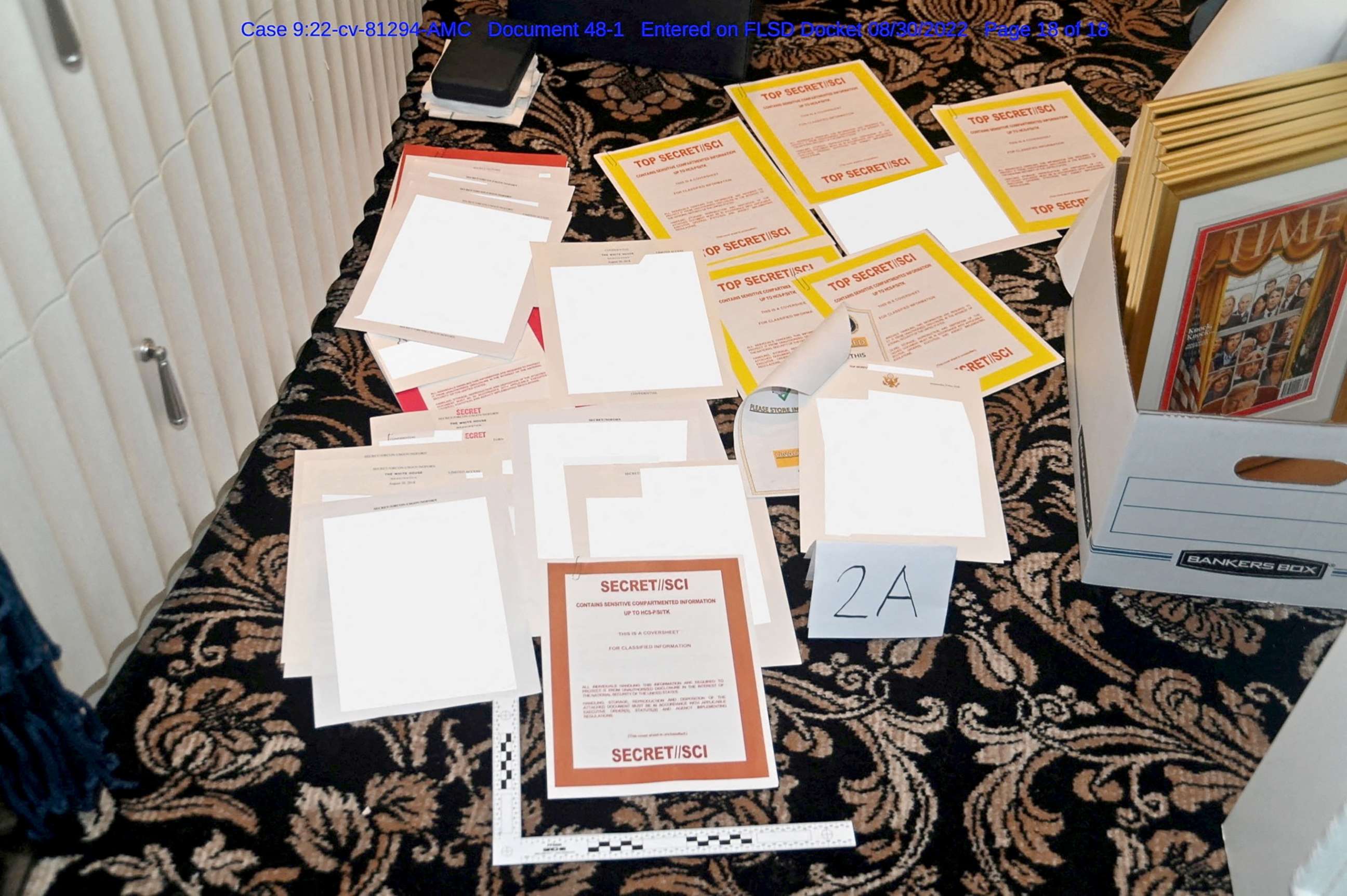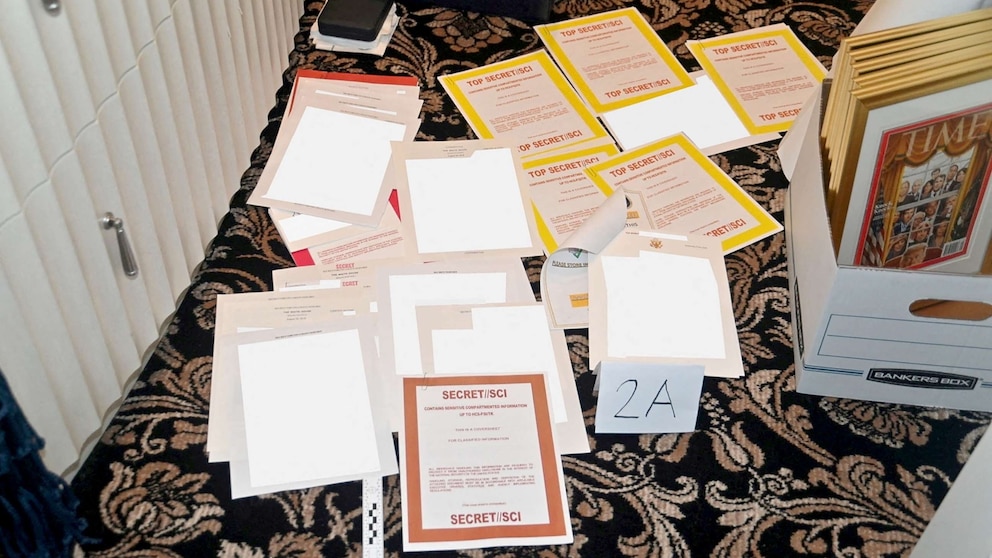Judge denies DOJ request for stay in investigation of Trump's Mar-a-Lago docs
U.S. District Judge Aileen Cannon on Thursday denied the Department of Justice's request for a partial stay of her ruling that limited the government's investigation of how Donald Trump handled sensitive material at his Mar-a-Lago estate, pending a third-party review of what agents found at Trump's home.
Cannon, in issuing her order, said that she was not willing to accept the government's assertions that roughly 100 documents taken from Mar-a-Lago were classified -- even though they were labeled as such, with some bearing "SECRET" and "TOP SECRET/SCI" markings.
Cannon appointed Raymond Dearie, senior district judge for the Eastern District of New York, as special master to help her resolve the matter. (Earlier this week, the DOJ wrote in court papers that it did not object to to Dearie, who was suggested by Trump's legal team.)
"The Court does not find it appropriate to accept the Government’s conclusions on these important and disputed issues without further review by a neutral third party in an expedited and orderly fashion," Cannon wrote in her order.
She approached with heavy skepticism the DOJ's arguments about the documents with classified markings and the government’s claims that Trump has no right to the materials at all.
In her rulings, Cannon is giving Trump an opportunity to assert both attorney-client and executive privilege, though his lawyers have not officially sought to assert either in court.
"The Court declines to conduct a subset-by-subset, piecemeal analysis of the seized property," Cannon wrote, in part, adding, "Indeed, if the Court were willing to accept the Government’s representations that select portions of the seized materials are—without exception—government property not subject to any privileges, and did not think a special master would serve a meaningful purpose, the Court would have denied Plaintiff’s special master request."
In appointing Dearie as special master, Cannon urged him to "prioritize review" of the roughly 100 documents with classification markings and asked him to complete his review of all the documents by Nov. 30, more than a month beyond what the DOJ had called for.
Her order further directs Dearie that he will make recommendations to her regarding any assertions of executive privilege by Trump, though he hasn't officially made any.
Many legal scholars question whether a former government official, even a president, can claim privilege over classified documents once they are no longer in office -- and over the determination made by the current president, in this case Joe Biden.
In a ruling last week, Cannon had enjoined the FBI from using roughly 100 documents seized from Mar-a-Lago with classification markings in its ongoing criminal investigation of Trump, who denies wrongdoing.
In her Thursday order, Cannon offered more clarity about her initial ruling, which will allow the government to move forward in a number of key areas. While the DOJ cannot -- at this point -- use the seized documents before a grand jury or interview witnesses about their content, the judge will allow the government to investigate how the documents were stored and who may have had access to them, including talking to witnesses.
Cannon also ruled that federal investigators are not precluded from briefing congressional leaders on the seized materials and that the DOJ can continue to work with intelligence officials on their damage assessment without being in violation of her order.

Prosecutors had warned of 'harm' to national security
In a filing last week that amounted to a line-by-line rebuke of Cannon's initial ruling, DOJ prosecutors wrote that they would seek intervention by the 11th Circuit Court of Appeals if she declined to act on their request for a partial stay by the end of Thursday.
Prosecutors cited the potential for "irreparable harm" to national security -- not just from the FBI having to halt their criminal investigation of the recovered records but from the uncertainty her ruling had separately caused, leading the intelligence community to pause its own separate review of whether the classified records, or any intel sources or methods, have been compromised.
“In order to assess the full scope of potential harms to national security resulting from the improper retention of the classified records, the government must assess the likelihood that improperly stored classified information may have been accessed by others and compromised,” the DOJ counterintelligence chief, Jay Bratt, wrote in the filing, specifically referencing the dozens of empty folders with classified banners on them taken from Trump's estate and the need to assess whether documents that were previously in them were compromised or remain missing.
In her order Thursday, Cannon wrote that she was not persuaded by the government's arguments that there would be irreparable harm to national security, calling their argument not "sufficiently convincing" given, she wrote, they had not suggested any "identifiable emergency" related to Trump's allegedly unlawful retention of the documents.
Further, she cited "leaks to the media" after the FBI's search, saying they undermined the government's arguments.
In a filing on Tuesday, DOJ chief Bratt took aim squarely at the arguments put forward by Trump's legal team, urging Cannon to reject the DOJ request for a stay.
Not only had Trump's team failed to respond to several points in their argument that Trump has no right to documents bearing classification markings, DOJ prosecutors argued, but at no time had Trump's attorneys ever asserted that he declassified any of the documents or declared them as his personal records.
“Even if Plaintiff had declassified these records, and even if he somehow had categorized them as his “personal” records for purposes of the [Presidential Records Act]—neither of which has been shown—nothing in the PRA or any other source of law establishes a plausible claim of privilege or any other justification for an injunction restricting the government’s review and use of records at the center of an ongoing criminal and national security investigation," Bratt wrote.
The DOJ has separately appealed the entirety of Cannon's ruling to the 11th Circuit, which appointed the special master.
As that process is worked through, the government has not objected to handing over any non-classified documents or other potentially personal materials to a special master for review.




